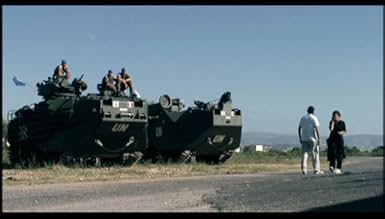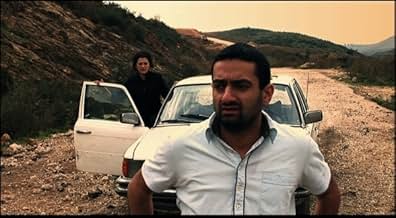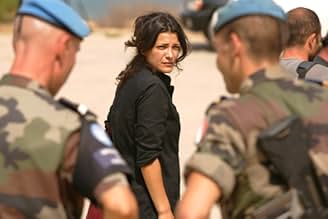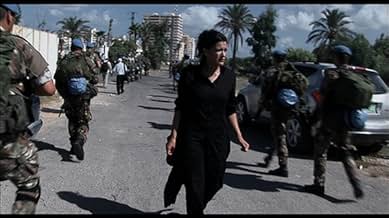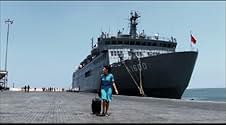IMDb रेटिंग
7.0/10
1.8 हज़ार
आपकी रेटिंग
अपनी भाषा में प्लॉट जोड़ेंIn the wake of Israel's 2006 bombardment of Lebanon, a determined woman finds her way into the country convincing a taxi cab driver to take a risky journey around the scarred region in searc... सभी पढ़ेंIn the wake of Israel's 2006 bombardment of Lebanon, a determined woman finds her way into the country convincing a taxi cab driver to take a risky journey around the scarred region in search of her sister and her son.In the wake of Israel's 2006 bombardment of Lebanon, a determined woman finds her way into the country convincing a taxi cab driver to take a risky journey around the scarred region in search of her sister and her son.
- निर्देशक
- लेखक
- स्टार
- पुरस्कार
- 8 जीत और कुल 4 नामांकन
फ़ीचर्ड समीक्षाएं
We were fortunate enough to see this film at the Sundace Film Festival, and I have rarely seen a more accomplished effort at portraying one of the worst atrocities of the past decade. Director Philippe Aractingi's ability to bring two feature actors into Lebanon on the tenth of thirty-three days of brutal Israeli bombing is nothing short of magnificent. Before seeing the film, I thought it may be a better case study of the war-torn environment left by the indescriminate bombing of civilian areas by the Israeli Army, with some actors thrown in at the last minute in a patchwork attempt to create a feature film. I was painfully wrong. This film is a compelling character drama told through the eyes of real people experiencing the worst kind of hell on earth. With unbelievable footage of the actors in the middle of the ongoing conflict, international media coverage, and the U.N. relief mission, Aractingi deftly (and powerfully) combines his fictional characters will real life survivors to tell the story of a mother trying to find her son in the ruins of war-torn Lebanon. The main character's decision to hire the initially lecherous, but ultimately compassionate and sympathetic taxi driver Tony to take her on her journey results in a touching tale of humanity and the place of individuals in a world beyond they're control. When asked about his filming techniques in the Q&A after the movie, Aractingi expressed his desire for the movie to be seen for the message it carries, as it should be.
Director Aractingi shot this film in the immediate wake of the systematic 34-day Israeli bombing of Lebanon in summer 2006, which left much of the country devastated, especially the South. He uses his own footage of the bombing itself, which shows whole neighborhoods being decimated, and then shoots among the rubble to tell the story of Zaina (Nada Abou Farhat), a divorced mother who comes from Dubai, where she was living with her architect husband, to find Karim, her six-year-old son, who was trapped by the bombing in Kherbet Salam, a Shia Muslim village in southern Lebanon. Zaina left Karim there with her sister, ironically, to "protect" him from the stress of her divorce. The only taxi driver who'll make the dangerous trip is Tony (George Khabbaz), a Christian who turns out to be from the South himself.
Aractingi got the idea of shooting in war devastation with an improvised plot in 1989 as Lebanon's civil war of that time wound down, but fear prevented him from proceeding. Instead he shot 40 documentaries and one feature that used improvisation (the 2005 Bosta) and also starred Nada Abou Farhat. As he got to work with his cast and crew for Under the Bombs, beginning shooting during the bombing and continuing during the ceasefire, he made the decision not to deal with the war so much as its impact on innocent victims, which Zaina and Karim obviously are.
And many of the people and their sufferings are authentic and real-time. When Tony and Zaina reach Kherbet Salam the building her sister lived in is completely destroyed. A young woman comes up and tells her Maha, her sister, is a martyr now. Zaina and Tony go to witness the disinterring of those who died to be reburied in "martyrs' graves," hoping to find the body of Maha (they do not). Aractingi films the actual funerals--not an easy task.
People say Karim was taken up by foreign journalists and went away with them, and this leads Tony and Zaina further south, just a few kilometers from the Israeli border, where they stop over with Tony's Christian family. It emerges that they were collaborators during the long Israeli occupation of south Lebanon and one brother is among those who fled to live in Israel in the aftermath of that time. The confrontation between Tony and his relatives over this collaboration is the fruit of discussions among villagers which Aractingi and his co-writer, Michel Léviant, condensed into a script. This is one example of how the actual fed into the fictional in the day-to-day shooting.
The emotions are powerful and the backgrounds are horrifying in the film. Nothing quite equals the sense of identification when Zaina looks at a whole street where her sister lived and finds only ruins after the systematic bombing destruction. Less successful at times are the interactions between Zaina and Tony, who flirts, comforts, and acts out a surprisingly graphic sex scene with a room clerk at a hotel they stop at on the way. Khabbaz and Abou Farhat are good, but some cutting might have helped eliminate distracting elements. The car's breaking down just before the couple gets to the monastery where Karim is rumored to be seems a rather obvious suspense device too.
The film is neutral as it can be, perhaps to a fault. One wonders why Hezbollah is barely even mentioned, since it is the other party in the warfare, and was the prime provider of aid to the victims in the bombing's immediate aftermath. Though the collaborating family members refer to being "forced to work for the Devil," meaning Israel, the focus is on the suffering rather than its source. Aractingi's film has flaws, but its boldness in bringing to the screen the 2006 bombing of Lebanon and the civilian suffering it caused can't be faulted.
The San Francisco International Film Festival 2008 provided the West Coast premiere of this film, which was scheduled to open less than two weeks later, on May 12, in Paris. This was nominated for the Grand Jury prize at Sundance and received the EIUC Award at Venice.
Aractingi got the idea of shooting in war devastation with an improvised plot in 1989 as Lebanon's civil war of that time wound down, but fear prevented him from proceeding. Instead he shot 40 documentaries and one feature that used improvisation (the 2005 Bosta) and also starred Nada Abou Farhat. As he got to work with his cast and crew for Under the Bombs, beginning shooting during the bombing and continuing during the ceasefire, he made the decision not to deal with the war so much as its impact on innocent victims, which Zaina and Karim obviously are.
And many of the people and their sufferings are authentic and real-time. When Tony and Zaina reach Kherbet Salam the building her sister lived in is completely destroyed. A young woman comes up and tells her Maha, her sister, is a martyr now. Zaina and Tony go to witness the disinterring of those who died to be reburied in "martyrs' graves," hoping to find the body of Maha (they do not). Aractingi films the actual funerals--not an easy task.
People say Karim was taken up by foreign journalists and went away with them, and this leads Tony and Zaina further south, just a few kilometers from the Israeli border, where they stop over with Tony's Christian family. It emerges that they were collaborators during the long Israeli occupation of south Lebanon and one brother is among those who fled to live in Israel in the aftermath of that time. The confrontation between Tony and his relatives over this collaboration is the fruit of discussions among villagers which Aractingi and his co-writer, Michel Léviant, condensed into a script. This is one example of how the actual fed into the fictional in the day-to-day shooting.
The emotions are powerful and the backgrounds are horrifying in the film. Nothing quite equals the sense of identification when Zaina looks at a whole street where her sister lived and finds only ruins after the systematic bombing destruction. Less successful at times are the interactions between Zaina and Tony, who flirts, comforts, and acts out a surprisingly graphic sex scene with a room clerk at a hotel they stop at on the way. Khabbaz and Abou Farhat are good, but some cutting might have helped eliminate distracting elements. The car's breaking down just before the couple gets to the monastery where Karim is rumored to be seems a rather obvious suspense device too.
The film is neutral as it can be, perhaps to a fault. One wonders why Hezbollah is barely even mentioned, since it is the other party in the warfare, and was the prime provider of aid to the victims in the bombing's immediate aftermath. Though the collaborating family members refer to being "forced to work for the Devil," meaning Israel, the focus is on the suffering rather than its source. Aractingi's film has flaws, but its boldness in bringing to the screen the 2006 bombing of Lebanon and the civilian suffering it caused can't be faulted.
The San Francisco International Film Festival 2008 provided the West Coast premiere of this film, which was scheduled to open less than two weeks later, on May 12, in Paris. This was nominated for the Grand Jury prize at Sundance and received the EIUC Award at Venice.
This movie was chosen by filmmovement.com. Often I find the movies they chose to lack heart and leave the viewer bereft in some way. This is the exception. True, the subject matter is devastating. However, the way it is handled is so delicate that it somehow inherently contains a message of hope. I have seen this movie several times, and find that the characters have stuck with me. I've not gotten enough of them.. I want their story to continue. I will, however, caution the viewer: if you don't want your political consciousness raised, you must stay away from this movie. It in no way coerces the viewer; it simply offers such a different perspective, you can't help but be redirected in subtle ways. Well done to the entire cast and crew of this movie.
What better way to shoot the movie than amidst the rubble and destruction resulting from the the 2006 Lebanon War. How's this for realism in movies?
Zeina (Nada Abou Farhat) captures the raw emotions of grief and despair of possibly losing a young son in the war, as she races against time to locate him. This desperation moves Tony (George Khabbaz) to be more helpful to her. George Khabbaz succeeeds in showing the viewer his change of heart.
Great shots of the Lebanese countryside specially those places untouched by the air strikes.
The viewer is tempted to brush up on what provoked the war. Will this happen again to a land that has known armed conflict for so long?
Zeina (Nada Abou Farhat) captures the raw emotions of grief and despair of possibly losing a young son in the war, as she races against time to locate him. This desperation moves Tony (George Khabbaz) to be more helpful to her. George Khabbaz succeeeds in showing the viewer his change of heart.
Great shots of the Lebanese countryside specially those places untouched by the air strikes.
The viewer is tempted to brush up on what provoked the war. Will this happen again to a land that has known armed conflict for so long?
Enjoyable movie. Acting is solid. Mix of real life footage it was hard to tell what was staged and what was real. Really makes you wonder why civilised human societies still insist on bombing each other to the stone ages.
क्या आपको पता है
- ट्रिवियाLebanon's 2009 Academy Awards official submission to Foreign-Language Film category.
- इसके अलावा अन्य वर्जनAfter he had received criticisms about the (very soft) sex scene, the director Philippe Aractingi made a version of the movie without this sex scene, for Arab countries.
टॉप पसंद
रेटिंग देने के लिए साइन-इन करें और वैयक्तिकृत सुझावों के लिए वॉचलिस्ट करें
- How long is Under the Bombs?Alexa द्वारा संचालित
विवरण
बॉक्स ऑफ़िस
- दुनिया भर में सकल
- $4,88,227
- चलने की अवधि1 घंटा 38 मिनट
- रंग
- ध्वनि मिश्रण
- पक्ष अनुपात
- 1.85 : 1
इस पेज में योगदान दें
किसी बदलाव का सुझाव दें या अनुपलब्ध कॉन्टेंट जोड़ें



